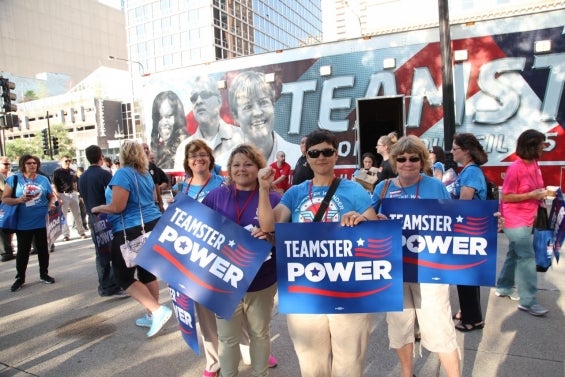Headline News
Nothing’s Fair About Being A Woman In The Workplace

Editor’s note: This is the second of five Teamster In Depth blog postings set to run every Tuesday leading up to the Nov. 4 election that will examine issues of importance not only to Teamsters, but all workers. It is because of these matters that it is imperative for hardworking Americans to educate themselves and vote for pro-worker candidates this fall. Click here to read previous election-related blogs.
It may be the 21st century, but for too many working women it might as well be the Dark Ages. Their wages continue to lag significantly behind their male counterparts. And congressional efforts to change it have been hampered repeatedly by Senate Republicans.
The latest rebuffing of wage equity came last month, when the GOP halted an effort to move forward with the Paycheck Fairness Act. It marked the third time since 2012 that lawmakers refused to allow the legislation to proceed to a final vote. One would have to be blind not to see the writing on the wall – those in opposition don’t think women making only 78 cents to every dollar men earn is a problem.
How do we know that? Because of the litany of excuses they trot out. They discount the federal statistics, saying they compare women and men in different job fields. They also argue female pay is lower because more women work part time or are primary caregivers.
But a recent report by the American Association of University Women (AAUW) delves deeply into the topic. And it finds all those excuses (and more) are just bunk. The survey notes the wage divide between women and men has largely remained stagnant during the past decade, exists in nearly every occupation and is prevalent among women without children as well. While education may help lessen the wage gap, it doesn’t totally alleviate it.
Maybe most alarming is that the pay divide actually grows with age. Per the document: “In 2012, for full-time workers ages 20–24, women were paid 89 percent of what men were paid on a weekly basis. Among workers 55–64 years old, women were paid only 76 percent of what their male peers were paid. Women typically are paid about 90 percent of what men are paid until around the age of 35, at which point median earnings for women start to grow much more slowly than median earnings for men.”
It is clear the U.S. faces a problem when it comes to equal pay. It is an issue that needs to be dealt with legislatively, and the good news is there are many ways to do so. Not only would acting on the Paycheck Fairness Act help, but so would congressional action to raise the minimum wage and tipped minimum wage as well. Also, pushing for affordable child care, paid sick days, family and medical leave and fair scheduling practices would go a long way as well.
All working women want is to be treated with fairness and respect. But it is clear from these reports that working women are not.
That’s why the upcoming election is so very important to middle-class Americans. Paycheck equality won’t be accomplished until elected officials who represent workers are put in office. On Nov. 4, let’s elect the pro-worker candidates that can make paycheck equality a reality.